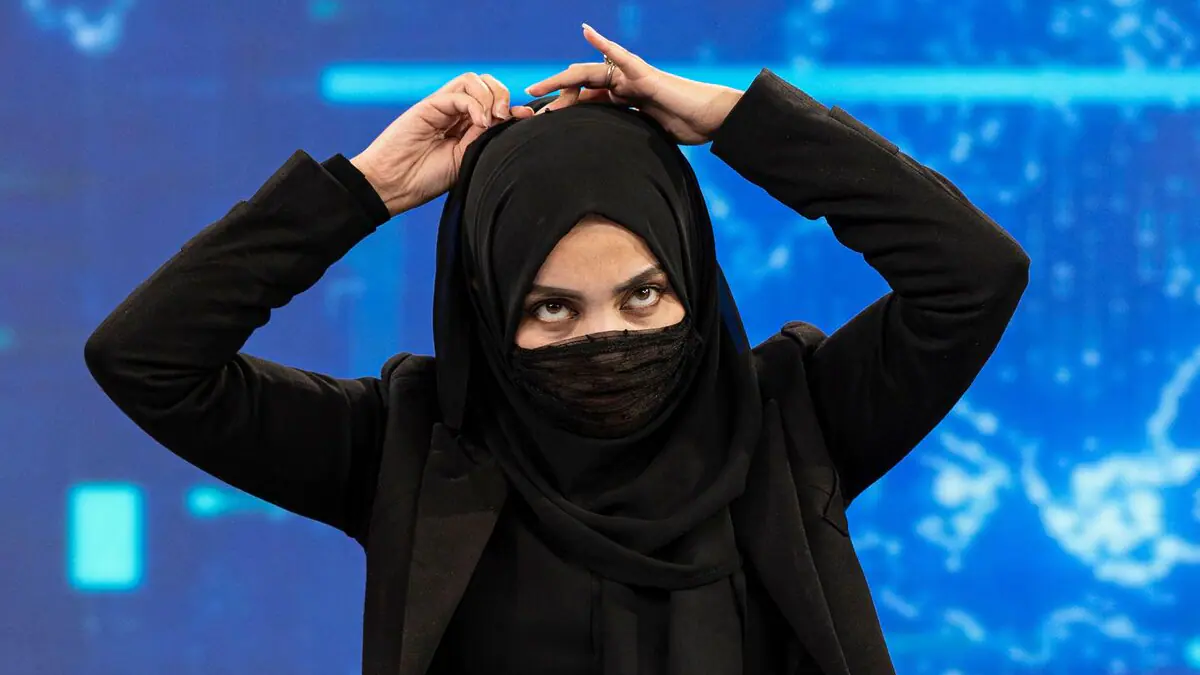The presenters of major Afghan TV news channels, forced by the Taliban to cover their faces on air, vowed on Sunday to continue fighting for their rights.
• Read also: Washington calls on the Taliban to respect women’s rights
• Read also: ‘Good news’ about girls’ education in Afghanistan
• Read also: Women protesting in Kabul against the full veil
Since their return to power last year, the Taliban have imposed a series of restrictions on civil society, many of them aimed at subjugating women to their fundamentalist conception of Islam.
Earlier this month, the Taliban’s supreme leader issued an order requiring women to completely cover themselves in public, including the face, ideally with a burqa, a full-face covering with a mesh of cloth at eye level.
Previously, it was enough just to cover the hair.
Afghanistan’s Ministry of Promotion of Virtue and Prevention of Vice has ordered female television presenters to comply by Saturday.
Female journalists initially chose not to comply with this order, appearing live without hiding their faces.
Before the turn around: Sunday presenters wore a full veil, leaving only their eyes and foreheads visible, to show newspapers on TOLOnews, Ariana TV, Shamshad TV and 1TV channels.

France Press agency
“We resisted and beat the wearing” of the full veil, said TOLOnews host Sonia Niazi. But Tolonews was under pressure.”
“Today they forced us to wear a mask, but we will continue our struggle with our voice (…) I will be the voice of other Afghan women,” she pledged after presenting a press release. “We will come to work until the Islamic Emirate takes us out of public places or forces us to stay at home.”
“We will keep fighting until our last breath,” 1TV presenter Lima Specali confirmed, a few minutes before she went on air with her face covered.
Khbulwak Sabai, director of TOLOnews, said the channel had “forced” its staff to carry out the order.
“We were told: ‘You have to do it,'” Mr. Sabai told AFP. You have to do it. There is no other solution.” “I was called on the phone yesterday and asked in strict terms to do so. So, we do it not by choice, but rather constrained and compelled.”
During the day, men, journalists and staff, working at TOLOnews’ Kabul headquarters, wore a mask covering their faces in solidarity with the presenters. The other employees continued to work with their faces uncovered.
In the evening, announcers from TOLOnews and 1 TV went on air wearing black face masks, protesting the Taliban’s orders.
Muhammad Sadiq Akef Muhajir, a spokesman for the Taliban’s Ministry of Promotion of Virtue and Prevention of Vice, said the authorities had no intention of forcing broadcasters to quit their jobs.
“We are happy that the channels have exercised their responsibility properly,” he told AFP.
The Taliban also ordered the dismissal of women working in the government if they failed to adhere to the new dress code. Male employees are also at risk of dismissal if their wives or daughters do not comply.

France Press agency
The Taliban regained power in August 2021 declaring a regime more flexible than it had been during their first strict rule.
But in recent months they have begun to suppress dissent and curtail freedoms, especially for women, in education, work and daily life.
They began by requiring women to wear at least a headscarf, a scarf that covers the head, but reveals the face. Then, at the beginning of May, they were required to wear the niqab in public, preferably the burqa, which was already mandatory when they were in power from 1996 to 2001.
In the 20 years since the Taliban was ousted in 2001, many rural, conservative women have continued to wear the burqa. But many other Afghan women, especially in cities, including TV presenters, chose the simple veil.
Television channels have already stopped broadcasting soap operas and soap operas depicting women on the orders of the Taliban.

“Extreme twitteraholic. Passionate travel nerd. Hardcore zombie trailblazer. Web fanatic. Evil bacon geek.”

